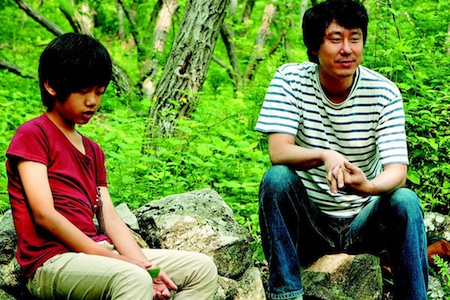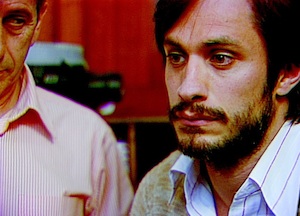It might be an exaggeration to say the well-attended 16-day Vancouver International Film Festival is the greatest little-known film festival on the continent, or it might not be. It is, by design, an audience festival rather than a film critic destination. Opening just weeks after the Toronto International has closed, it offers few major premieres but plenty of quality films shuttling between Venice, Cannes and Toronto, before heading into wide release or traveling further onto the festival circuit.
This year’s edition kicked off on Thursday, September 27, with a gala screening of Midnight’s Children, a Canada-India co-production from Canadian filmmaker Deepa Mehta, and closes on Friday, October 12, with Leos Carax’s Holy Motors. In between are screenings of Michael Haneke’s Palme d’Or winner Amour, Ken Loach’s Cannes Jury Prize winner The Angel’s Share, Thomas Vinterberg’s The Hunt (Best Actor at Cannes), Cristian Mungiu’s Beyond the Hills (Best Actress and Best Screenplay, Cannes), Christian Petzold’s Barbara (Best Director, Berlin), Ben Lewin’s Sundance winner The Sessions, Jacques Audiard’s Rust and Bone, Abbas Kiarostami’s Like Someone in Love, Pablo Larrain’s No, Olivier Assayas’s Venice premiere Something in the Air, Raul Ruiz’s final film, Night Across the Street, the international premiere of Any Day Now (an audience-award winner at Seattle and Tribeca), and the North American premiere of I, Anna, starring Charlotte Rampling and directed by her son, Barnaby Southcombe, just to name a few of the over 230 features playing over two-plus weeks I resist the temptation to use the old term “unspool” because only a fraction of the films are presented on 35mm—a sign of the times. Most films are digital now, but unlike a certain major American event, not a single DCP screening in my five-day visit was cancelled for equipment failure.
My focus is and has for years been the Dragons and Tigers sidebar: the biggest focus on contemporary Asian cinema in North America. The Dragons and Tigers lineup is valuable as both an introduction to new films from young filmmakers and a snapshot of commercial cinemas of Asia, from South Korea and Japan to China and the Philippines. It comprises 45 features, a handful of mid-length (under an hour) films, and dozens of shorts—too many to do anything more than sample. Armed with a catalogue, a few recommendations and my own instinct and tastes, that’s what I did.
The most fun I had in the Asian line-up was the Japanese comedy Key of Life, a spirited bit of role swapping between a struggling, suicidal actor and an amnesiac hitman when the latter knocks his head in a bathhouse accident and the former trades identities for a fresh start. Rounding out the leads is a highly organized magazine editor who plans out an entire courtship and marriage before even meeting her prospective boyfriend. Director/writer Uchida Kenji’s lighthearted black comedy recalls the comic sensibility of Sabu, though at a more measured pace and with a much tidier narrative. It’s a film where personality triumphs over circumstance, even when circumstances take some unexpected (and thoroughly entertaining) turns.
Even more inventive (if not quite as directorially accomplished) is Romance Joe (South Korea), the directorial debut of Hong Sang-soo’s former assistant Lee Kwang-kuk. A film about stories and storytelling, it offers a runaway production assistant, a creatively blocked filmmaker, a chatty call-girl, and teenage lovers. These stories are all nestled within and swirling around one another, all occupying a delicate state between character autobiography and tall tale, the narrative equivalent of Schrödinger’s cat: at once “true stories” and fictional concoctions, all interconnected by clever crossovers and clues that leave more questions than answers. Lee lacks a visual equivalent to his narrative cleverness but he trusts the viewer enough make them part of the storytelling process.
Also from South Korea is Nameless Gangster, a wry gangster drama that is more character piece than action thriller. Choi Min-sik (of Oldboy) is a petty customs officer who discovers he’s the clan elder of a young gangster with Yakuza connections and works his way into a partnership. The film plays on the definition of daebu—godfather—in Korean culture, meaning both an elder member of a clan and a crime boss, and Choi confuses one for the other. Set in 1990, during the big government crackdown on organized crime, with flashbacks to Choi’s almost (but not quite) comic rise to power, director Yoon Jong-bin offers something that straddles social satire and comedy of errors with dire consequences, but also traffics in the blithe corruption at all levels of government.
On a more serious level, Emily Tang’s All Apologies is a strong and uncompromising drama from China built on the anxiety over family size and the still prevalent belief that boy children are more valuable and important than girls. It becomes an issue when a traffic accident kills the only son of a troubled couple, setting off a chain reaction of blame, anger, resentment and secret measures to balance the scales, which of course are simply thrown further out of balance. Tang won the Dragons and Tigers Award for new directors in 2008 with Perfect Life and this is a powerful follow-up. The emotional responses of the four main characters could be melodramatic overkill, but there is real anger, loss, pain and desperation driving it all. And at the root of it is an attitude that children are as much property as family, that boys have a special value and the death of one means someone must be made to pay, regardless of fault.
I missed Hong Sang-soo’s newest film In Another Country (South Korea), starring Isabelle Huppert, which came highly recommended, but I did catch the latest exercises from a couple of other major filmmaker working in the short form. Weerasethakul Apichatpong’s 56-minute Mekong Hotel (Thailand), a story of young maybe lovers and a mother who turns out to be a Pob ghost (which means she’s found munching on human and animal entrails, furtively looking about like a nervous scavenger) plays out like a sketch of a film, with pieces of documentary dropped in and a guitar scratch track setting the mood. Like the best of Weerasethakul, it casts a spell, but it’s a case of the director working in a minor key.
Tsai Ming-liang’s Walker (Hong Kong/Taiwan), a short contribution to the anthology film Beautiful 2012, is a gorgeous cinematic art piece with his longtime actor (Lee Kang-sheng) in red Buddhist robes and shaved head walking through Hong Kong in self-restrained slow motion. With his head down and hands filled with what appears to be a takeout meal, he’s the world’s slowest delivery boy. (Add your own jokes here.) But it’s also mesmerizing watching the deliberation of his footfalls, the head hung down in contemplation, the curiosity of the onlookers (who periodically stare into the camera) while the inevitable punchline is so satisfying.
Not that I remained solely in the Asian line-up. Thomas Vinterberg’s The Hunt knotted my stomach up with the worst in human behavior coming out after an accusation of child abuse and snowballing mob mentality. The script stacks the deck by leaking what should be a quiet initial investigation and churning up hysteria through rumor, but it nonetheless traffics in primal emotions and it’s indeed pretty raw.
Pablo Larrain shot No (Chile), his dramatization of the real-life campaign to take on General Pinochet’s regime through the media in his 1988 plebiscite vote, on U-matic video (the three-quarters-inch broadcast tape standard of the ’80s), which gives his film a strange, washed-out quality, like a manufactured time capsule of an era. Larrain says it’s the third in a trilogy of life under Pinochet, and while it’s nowhere as dark as his previous films, an atmosphere of intimidation hangs over the characters. These shadows of fear really communicate how and why Pinochet was convinced he would win the vote regardless of the opposition, and why our hero (a composite of numerous real-life people played by Gael Garcia Bernal) chose a completely unexpected approach to use their 15 minutes of uncensored air time and sold the idea of free elections like it was a soft-drink campaign.
A Respectable Family (Iran) made its North American premiere at VIFF and deserves to be far more widely seen. It begins as a family drama, with a scholar who fled Iran after the revolution returned as a visiting professor, fighting censorship and bureaucracy at work and refusing to visit his estranged father (a former war profiteer) and half-brother until his father is on his deathbed. But it soon moves into territory that combines crime thriller, social drama and political commentary. The less you know going in, the better, as the turns are masterfully managed by director/writer Massoud Bakshi, and the unfolding of the family drama informs his social critique of Iran, both then and now. No surprise that the film has not played in its home country.
Any Day Now is the kind of American drama that Hollywood used to specialize in: character based, issue-focused, emotionally grounded, and an actor’s showcase. It’s 1979 and two gay men— Alan Cumming as a flamboyant female impersonator and Garret Dillahunt as a newly out and still uncomfortable homosexual—take on the city to adopt an abandoned special-needs boy. Travis Fine makes a point of capturing the everyday intimacy of this loving couple, the nonchalant physicality and easy intimacy of people who make a life together, and it gives the film grounding and an authenticity. It doesn’t make speeches, it makes a commitment.
Endnotes
The VIFF trailer this year is a beautifully conceived and created little piece that captures the idea of British Columbia’s wilderness beauty and the power of cinema to transform it, all in a single short take. It also relies on a key sound cue: the whir of 35mm film running through a projector gate. Interesting how that is still the standard cue for projected film in a culture where digital screenings are now the rule and 35mm film is a rarity.
I repeatedly crossed paths (and shared a few meals) with Kristin Thompson and David Bordwell over my first five-day stay at VIFF. Here are their first dispatches from the festival: Kristin Thompson on international offers and David Bordwell on some of the Dragons and Tigers films:
Kristin Thompson: http://www.davidbordwell.net/blog/2012/10/02/around-the-world-in-a-multiplex-first-dispatch-from-vancouver/
David Bordwell: http://www.davidbordwell.net/blog/2012/10/04/memories-are-unmade-by-this/






